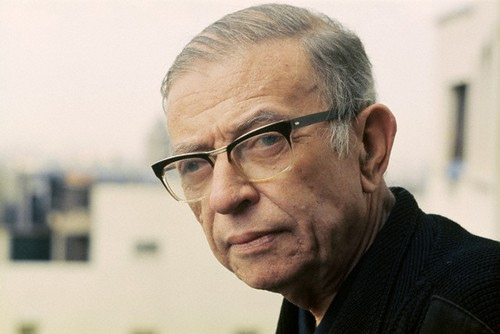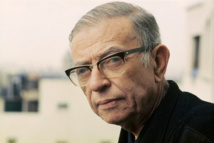He told a young AFP journalist, Francois de Closets -- who had been the first to break the news to him -- that he had no intention of accepting the honour.
"I refuse the prize, that's a fact, but I must reserve my explanations for the Swedish press," the existentialist thinker said.
At the time, AFP wrote that "the announcement of his selection by the jury in Stockholm did not seem to surprise him or provoke any emotion".
Sartre's lengthy statement, detailing the reasons for his "non" to the Nobel -- read out to journalists at the French embassy in Stockholm later that day -- created a sensation as it was the first time in the prize's then 63-year history that someone had turned it down.
However the decision was fully in keeping with his character and convictions, according to philosopher and Sartre expert Andre Guigot.
"He had two basic genuine reasons. First of all he was afraid of being considered a spent force before completing his life's work. He called it the kiss of death," he said.
"And secondly, he had based his thinking on criticism of all institutions, which he considered suffocating."
The only problem -- as Sartre soon discovered -- was that the Nobel regulations have no opt-out clause for laureates who refuse the prize.
- 'Carved in stone' -
"The Swedes were clear from the beginning. If Sartre refused the prize, it was no concern of the Academy. He had been selected and his name was going to be carved in stone," said Antoine Jacob, a former AFP reporter and author of "History of the Nobel Prizes".
So the French writer remains officially the 1964 Nobel literature laureate, despite snubbing the traditional award ceremony, and leaving 273,000 Swedish kronor (worth nearly $380,000, 300,000 euros today) untouched.
In his statement the author of the existential play "No Exit"(Huis Clos) with its iconic phrase "Hell is other people", said the decision was not a criticism of the Nobels.
He wrote that he had "always declined official honours", including the French Legion of Honour in 1945, as it would limit his independence and institutionalise him.
"It would not be the same thing if I sign my name Jean-Paul Sartre or if I sign Jean-Paul Sartre, Nobel laureate," he said.
Even before the award became official, media speculation had mounted that Sartre was shortlisted for the prize.
After a particularly optimistic forecast in the newspaper Le Figaro, he wrote directly to the Swedish Academy in an attempt to evade the impending award.
"According to certain information that I have become aware of today, I would appear to have a certain chance of obtaining the Nobel prize," he wrote.
"For both personal and other reasons of a more objective nature I do not wish to appear on the list of potential laureates. Be it in 1964 or later, I cannot, nor do I wish to, accept this honorary award."
- 'Very bourgeois attitude' -
It was no secret that Sartre, aged 59 at the time, was well placed to win the Nobel.
His autobiography "The Words" had come out in January that year, adding an intimate touch to his substantial output of plays, novels and philosophical works.
Legend has it that his letter requesting to be spared the honour of a Nobel did not reach the academy's permanent secretary Anders Oesterling on time. But others have speculated that Sartre's name may have already been decided before the letter arrived.
There is only one known case of a Nobel being refused in advance: Swedish poet Erik Axel Karlfeldt succeeded in persuading the members of the jury not to award him in 1919, but he had the unfair advantage of being a member of the jury himself.
He later won the prize posthumously in 1931 at a time when death was not a barrier to becoming a laureate.
But 50 years later the iconic French philosopher's Nobel snub is still controversial in some circles -- either seen as evidence of his strong convictions or his pride.
"It's a subject that still provokes discussion today. Because ultimately it's a very bourgeois attitude to refuse a prize," said Sartre expert Guigot.
"Albert Camus, who came from a completely different (poorer) background accepted it, because he knew its value."
The only other laureate to willingly refuse the Nobel was Vietnamese prime minister Le Duc Tho, who did not want to share the 1973 Nobel Peace Prize with US Secretary of State Henry Kissinger.
-------------------------------------------------------------------------------------------------------------------
"I refuse the prize, that's a fact, but I must reserve my explanations for the Swedish press," the existentialist thinker said.
At the time, AFP wrote that "the announcement of his selection by the jury in Stockholm did not seem to surprise him or provoke any emotion".
Sartre's lengthy statement, detailing the reasons for his "non" to the Nobel -- read out to journalists at the French embassy in Stockholm later that day -- created a sensation as it was the first time in the prize's then 63-year history that someone had turned it down.
However the decision was fully in keeping with his character and convictions, according to philosopher and Sartre expert Andre Guigot.
"He had two basic genuine reasons. First of all he was afraid of being considered a spent force before completing his life's work. He called it the kiss of death," he said.
"And secondly, he had based his thinking on criticism of all institutions, which he considered suffocating."
The only problem -- as Sartre soon discovered -- was that the Nobel regulations have no opt-out clause for laureates who refuse the prize.
- 'Carved in stone' -
"The Swedes were clear from the beginning. If Sartre refused the prize, it was no concern of the Academy. He had been selected and his name was going to be carved in stone," said Antoine Jacob, a former AFP reporter and author of "History of the Nobel Prizes".
So the French writer remains officially the 1964 Nobel literature laureate, despite snubbing the traditional award ceremony, and leaving 273,000 Swedish kronor (worth nearly $380,000, 300,000 euros today) untouched.
In his statement the author of the existential play "No Exit"(Huis Clos) with its iconic phrase "Hell is other people", said the decision was not a criticism of the Nobels.
He wrote that he had "always declined official honours", including the French Legion of Honour in 1945, as it would limit his independence and institutionalise him.
"It would not be the same thing if I sign my name Jean-Paul Sartre or if I sign Jean-Paul Sartre, Nobel laureate," he said.
Even before the award became official, media speculation had mounted that Sartre was shortlisted for the prize.
After a particularly optimistic forecast in the newspaper Le Figaro, he wrote directly to the Swedish Academy in an attempt to evade the impending award.
"According to certain information that I have become aware of today, I would appear to have a certain chance of obtaining the Nobel prize," he wrote.
"For both personal and other reasons of a more objective nature I do not wish to appear on the list of potential laureates. Be it in 1964 or later, I cannot, nor do I wish to, accept this honorary award."
- 'Very bourgeois attitude' -
It was no secret that Sartre, aged 59 at the time, was well placed to win the Nobel.
His autobiography "The Words" had come out in January that year, adding an intimate touch to his substantial output of plays, novels and philosophical works.
Legend has it that his letter requesting to be spared the honour of a Nobel did not reach the academy's permanent secretary Anders Oesterling on time. But others have speculated that Sartre's name may have already been decided before the letter arrived.
There is only one known case of a Nobel being refused in advance: Swedish poet Erik Axel Karlfeldt succeeded in persuading the members of the jury not to award him in 1919, but he had the unfair advantage of being a member of the jury himself.
He later won the prize posthumously in 1931 at a time when death was not a barrier to becoming a laureate.
But 50 years later the iconic French philosopher's Nobel snub is still controversial in some circles -- either seen as evidence of his strong convictions or his pride.
"It's a subject that still provokes discussion today. Because ultimately it's a very bourgeois attitude to refuse a prize," said Sartre expert Guigot.
"Albert Camus, who came from a completely different (poorer) background accepted it, because he knew its value."
The only other laureate to willingly refuse the Nobel was Vietnamese prime minister Le Duc Tho, who did not want to share the 1973 Nobel Peace Prize with US Secretary of State Henry Kissinger.
-------------------------------------------------------------------------------------------------------------------









 Home
Home Politics
Politics











